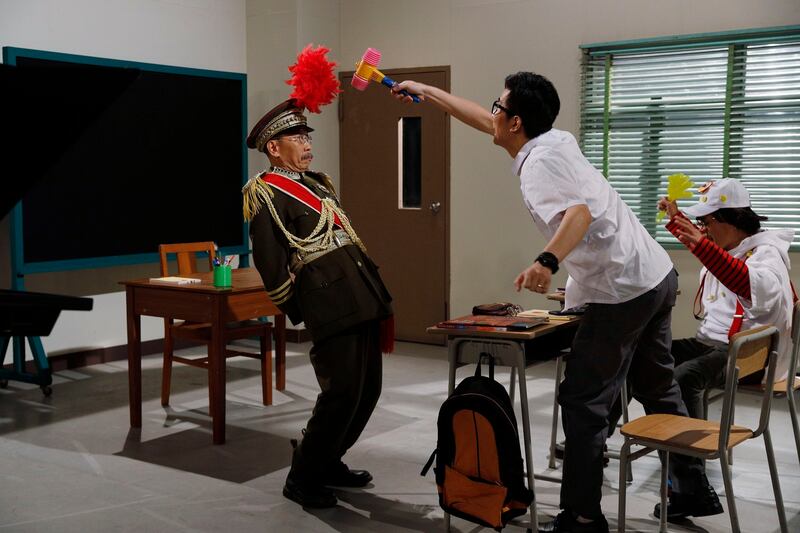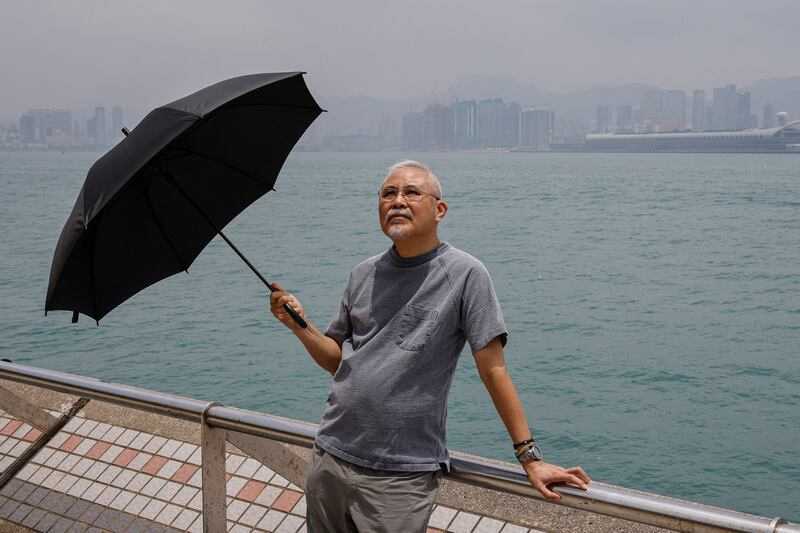Hong Kong's government broadcaster has removed thousands of episodes of old shows from its podcast platform in recent months, amid an ongoing purge of dissent in the city under a draconian national security law.
Episodes of several shows that were canceled but their archive retained on Radio Television Hong Kong's Podcast One website have now disappeared entirely, a survey of the site on Wednesday revealed.
The move has been likened to – and is possibly coordinated with – the removal of "politically sensitive" books and other content from Hong Kong's public libraries for fear of running afoul of the law, which bans public criticism of the authorities, according to an industry insider.
The deleted content includes the whole of the 30-year-old satirical news show "Headliner," axed in May 2020 after being criticized by top police officers for poking fun at their denials of violence against pro-democracy protesters during the 2019 protest movement.

A keyword search for the show, which prompted the government's Communications Authority to warn RTHK for "denigrating and insulting" the police, on the Podcast One website turned up the response "No results."
Similar results appeared after a search for "City Forum," a former live show that featured voices from across the political spectrum debating current affairs and ran for more than four decades until 2021.
Selected episodes of other shows dealing with topics viewed as "sensitive" by the ruling Chinese Communist Party -- including the 1989 Tiananmen massacre, police violence, the political cartoonist Zunzi and the national security law itself -- had also been removed from the platform.
'Political pressure'
Last month, the Chinese-language Ming Pao newspaper axed Zunzi's satirical cartoon after what he described as " political pressure'."
According to an in-depth investigation of the Podcast One site by independent Cantonese news site The Collective, several other shows have been removed from the site entirely in recent months, including "Left, Right, Red, Blue, Green," "Police Report" and "This Week."
Talk-show host Tsang Chi Ho, who anchored the last-ever episode of "Headline News," said all trace of the show now appears to have been removed from the public domain, and said it was similar to the recent purge of pro-democracy content from Hong Kong's public libraries.
"Now, future generations will think that there wasn't any satire in the media, if they don't know everything that happened in the past 10 or 20 years," Tsang said. "It's a similar effect to removing books from public libraries in Hong Kong."
"Even if the general public can hold onto their copies of these banned books, and are able to read them, they are denied as a part of official history," he said. "I think this will lead to historical errors."

A former high-ranking executive at Radio Television Hong Kong who gave only the pseudonym Mary said the removal of RTHK's podcast episodes is part of the responsibility of the station's "new media" department, and has been timed to coincide with the culling of politically sensitive books from public libraries.
"Only people on the inside know who is giving these orders, and which content is being selected [for deletion]," she said. "But these orders don't need to come down [the chain] -- everyone in middle-management knows what the criteria are, and they are interpreting them in the safest way possible."
"It seems that everyone knows they can't [interview] anyone from the 'yellow camp' -- pro-democracy supporters -- or anyone whose speech is fairly outspoken, free and straightforward," she said.
Government control
The government took steps in March 2021 to strengthen editorial control over its official broadcaster, bringing in career bureaucrat Patrick Li and reforming its editorial structure to " ensure it complies" with government directives.
The move, which came after repeated criticism of RTHK from senior figures including police commissioner Chris Tang, was lambasted by journalists as a further attack on press freedom in the city. The government then ordered the station to rebroadcast more "patriotic" content produced by the ruling Chinese Communist Party-backed China Media Group, to build "a sense of Chinese identity" among listeners.
Mary described Patrick Li's appointment as a turning point for the broadcaster.
"It's pretty clear what's allowed now ... He's been in office for [two years] and everyone knows where the lines are drawn," she said. "It's not just a question of who the director is -- it's the overall atmosphere and various external events like what happened to Zunzi, which means everyone would understand that he is a target for deletion."
She described the deletion of content as an "erasure" that would leave the public with a blank slate when it came to understanding their city’s recent history.
Translated by Luisetta Mudie. Edited by Paul Eckert.
